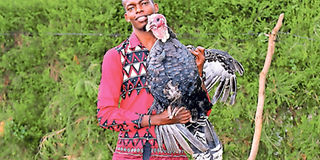Hobby that turned into a profitable poultry business

Onesmus Gitonga with a turkey in his enterprise in Nyeri. He rears his turkeys free-range, which means that the birds roam freely outdoors. PHOTO | PAULINE ONGAJI | NMG
What you need to know:
- Gitonga, 27, saw an opportunity in the birds and decided give them good care.
- He says though the birds offer good money, turkey farming isn’t a walk in the park.
- Feeding the birds also requires plenty of resources, according to the farmer.
- Gitonga rears his turkeys free-range, which means that the birds roam freely outdoors.
What started as a hobby for Onesmus Gitonga has turned into an agribusiness a year later.
In June last year, his father bought two turkeys, a tom and a hen from a friend to beautify their home and make it lively.
Gitonga, 27, saw an opportunity in the birds and decided give them good care.
“The hen hatched 15 chicks and I sold 10 of them. I was amazed by the profit I made and that’s when I realised this could be a great business,” he recounts, noting he, thereafter, bought six other mature hens from different farmers.
And the number has been increasing ever since then. Currently, he has 24 mature turkeys and 17 chicks.
“I have sold over 25 birds since I started, most of them chicks aged three to four months which go for Sh2,500 each and adults from between Sh3,500 and Sh6,000. Majority of those who buy them come from Nairobi and Nyeri,” says Gitonga, whose home is located in Ichagu, Nyeri County, and sells the birds through social media.
He says though the birds offer good money, turkey farming isn’t a walk in the park.
“I have come to learn that turkeys are prone to diseases, especially when they are still chicks. If you don’t maintain cleanliness, you could lose many of them especially at the initial stage,” he says.
Feeding the birds also requires plenty of resources, according to the farmer.
“A mature turkey will eat about 8kg of food in a month. On the other hand, a month old turkey will consume a kilo in the same period. Also this food must be high in protein. I supplement the commercial feeds with omena,” he offers.
Dr Ochieng Odede, a veterinarian and animal nutritionist and the technical and sales director, Sidai Africa (Kenya) Ltd, says hygiene is paramount in turkey farming.
NATURAL ENVIRONMENT
“Dirty environment leads to health problems like diarrhoea, eye illnesses, problems with breathing, lameness and infections of the skin all leading to high cost of treatments, loss of productivity and deaths.”
He advises that before one uses omena, which is nutritious, they should ensure it is of good quality, free from contaminants and impurities like bigger fish or shells.“Alternatives to omena include soya meal or cakes, sunflower meal or cakes, cotton seed meal or cakes,” he offers.
Gitonga rears his turkeys free-range, which means that the birds roam freely outdoors.
This, he says, keeps them in their natural conditions and allows them freedom of movement, a fact that according to Gitonga, saves him about 20 per cent of food costs as they are also able to eat foliage.
“I only house the chicks but when they reach three months, they are free to roam the farm.”
Dr Odede says that free-range turkey rearing offers the birds near natural environment.
“The birds are able to exercise while seeking their natural food in addition to supplementary feeds given by the owners. It is low cost where land is unlimited, and offers opportunity for organic turkey rearing,” he adds.
So successful has been Gitonga’s business that he has decided to add a variety of other birds including geese, ducks, guinea fowls and even pigeons.
“I have 12 adult geese which go for Sh3,500 and the young ones for Sh2,500. I also have eight guinea fowls that go for between Sh3,500 for adults and Sh2,500 for chicks. I sell adult ducks for Sh2,000,” he says.





